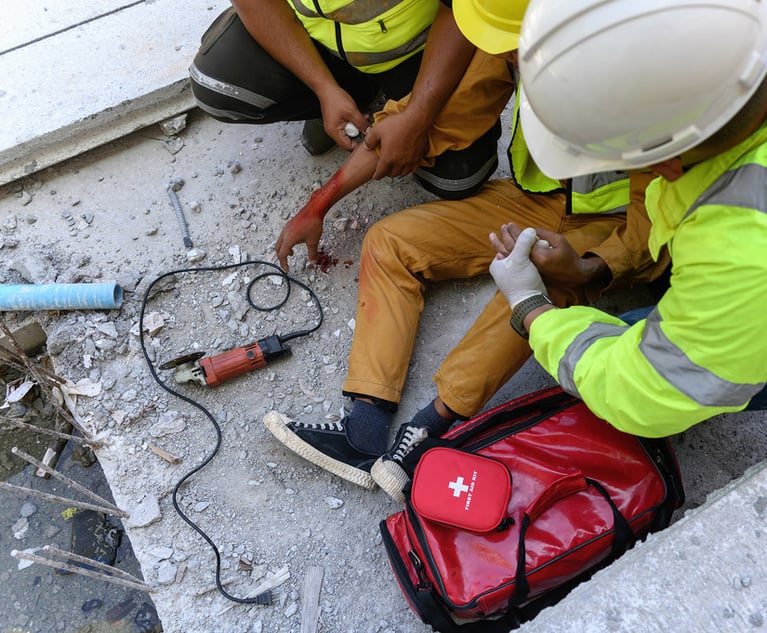What the Adnan Syed and Curtis Flowers Cases Highlight About Attorney Misconduct
We must continue to hold attorneys accountable and seek different solutions to prevent this type of injustice.
November 21, 2022 at 09:00 AM
8 minute read
 A few weeks ago, the state of Maryland granted Baltimore County Assistant State Attorney Marilyn Mosby's motion to vacate Adnan Syed's murder conviction. If you are unfamiliar with Syed, his criminal case was the subject of the first season of the Serial podcast. The Serial reporters investigated Syed's case by reviewing evidence and interviewing witnesses, including people who knew the victim (his ex-girlfriend) and Syed. Not surprisingly, the reporters highlighted issues with his case and presented their findings in a compelling way. The podcast was extremely popular generating over 40 million downloads in December 2014 as per CNN Entertainment. Given its popularity, it is likely that the podcast may have influenced Ms. Mosby's decision to file the motion to vacate Syed's conviction based partly on Brady violation concerns.
A few weeks ago, the state of Maryland granted Baltimore County Assistant State Attorney Marilyn Mosby's motion to vacate Adnan Syed's murder conviction. If you are unfamiliar with Syed, his criminal case was the subject of the first season of the Serial podcast. The Serial reporters investigated Syed's case by reviewing evidence and interviewing witnesses, including people who knew the victim (his ex-girlfriend) and Syed. Not surprisingly, the reporters highlighted issues with his case and presented their findings in a compelling way. The podcast was extremely popular generating over 40 million downloads in December 2014 as per CNN Entertainment. Given its popularity, it is likely that the podcast may have influenced Ms. Mosby's decision to file the motion to vacate Syed's conviction based partly on Brady violation concerns.
One legal issue that kept rearing its head in the show was whether Syed's attorney, Christina Gutierrez, provided ineffective assistance of counsel. After his conviction, Syed's subsequent attorneys argued on appeal that Gutierrez mishandled the case by not interviewing a potential alibi witness who stated she was with Syed around the time when the murder allegedly took place. Syed told Gutierrez about the witness and she said she looked into it but that nothing came of it. The alibi witness later stated in two affidavits that no attorney ever contacted her. The same witness testified at a post-conviction hearing that she was with Syed on the day of the murder during a time that conflicted with the state's timeline.
This content has been archived. It is available through our partners, LexisNexis® and Bloomberg Law.
To view this content, please continue to their sites.
Not a Lexis Subscriber?
Subscribe Now
Not a Bloomberg Law Subscriber?
Subscribe Now
NOT FOR REPRINT
© 2025 ALM Global, LLC, All Rights Reserved. Request academic re-use from www.copyright.com. All other uses, submit a request to [email protected]. For more information visit Asset & Logo Licensing.
You Might Like
View All
ABC's $16M Settlement With Trump Sets Bad Precedent in Uncertain Times
8 minute read

Neighboring States Have Either Passed or Proposed Climate Superfund Laws—Is Pennsylvania Next?
7 minute read
Trending Stories
- 1Gunderson Dettmer Opens Atlanta Office With 3 Partners From Morris Manning
- 2Decision of the Day: Court Holds Accident with Post Driver Was 'Bizarre Occurrence,' Dismisses Action Brought Under Labor Law §240
- 3Judge Recommends Disbarment for Attorney Who Plotted to Hack Judge's Email, Phone
- 4Two Wilkinson Stekloff Associates Among Victims of DC Plane Crash
- 5Two More Victims Alleged in New Sean Combs Sex Trafficking Indictment
Who Got The Work
J. Brugh Lower of Gibbons has entered an appearance for industrial equipment supplier Devco Corporation in a pending trademark infringement lawsuit. The suit, accusing the defendant of selling knock-off Graco products, was filed Dec. 18 in New Jersey District Court by Rivkin Radler on behalf of Graco Inc. and Graco Minnesota. The case, assigned to U.S. District Judge Zahid N. Quraishi, is 3:24-cv-11294, Graco Inc. et al v. Devco Corporation.
Who Got The Work
Rebecca Maller-Stein and Kent A. Yalowitz of Arnold & Porter Kaye Scholer have entered their appearances for Hanaco Venture Capital and its executives, Lior Prosor and David Frankel, in a pending securities lawsuit. The action, filed on Dec. 24 in New York Southern District Court by Zell, Aron & Co. on behalf of Goldeneye Advisors, accuses the defendants of negligently and fraudulently managing the plaintiff's $1 million investment. The case, assigned to U.S. District Judge Vernon S. Broderick, is 1:24-cv-09918, Goldeneye Advisors, LLC v. Hanaco Venture Capital, Ltd. et al.
Who Got The Work
Attorneys from A&O Shearman has stepped in as defense counsel for Toronto-Dominion Bank and other defendants in a pending securities class action. The suit, filed Dec. 11 in New York Southern District Court by Bleichmar Fonti & Auld, accuses the defendants of concealing the bank's 'pervasive' deficiencies in regards to its compliance with the Bank Secrecy Act and the quality of its anti-money laundering controls. The case, assigned to U.S. District Judge Arun Subramanian, is 1:24-cv-09445, Gonzalez v. The Toronto-Dominion Bank et al.
Who Got The Work
Crown Castle International, a Pennsylvania company providing shared communications infrastructure, has turned to Luke D. Wolf of Gordon Rees Scully Mansukhani to fend off a pending breach-of-contract lawsuit. The court action, filed Nov. 25 in Michigan Eastern District Court by Hooper Hathaway PC on behalf of The Town Residences LLC, accuses Crown Castle of failing to transfer approximately $30,000 in utility payments from T-Mobile in breach of a roof-top lease and assignment agreement. The case, assigned to U.S. District Judge Susan K. Declercq, is 2:24-cv-13131, The Town Residences LLC v. T-Mobile US, Inc. et al.
Who Got The Work
Wilfred P. Coronato and Daniel M. Schwartz of McCarter & English have stepped in as defense counsel to Electrolux Home Products Inc. in a pending product liability lawsuit. The court action, filed Nov. 26 in New York Eastern District Court by Poulos Lopiccolo PC and Nagel Rice LLP on behalf of David Stern, alleges that the defendant's refrigerators’ drawers and shelving repeatedly break and fall apart within months after purchase. The case, assigned to U.S. District Judge Joan M. Azrack, is 2:24-cv-08204, Stern v. Electrolux Home Products, Inc.
Featured Firms
Law Offices of Gary Martin Hays & Associates, P.C.
(470) 294-1674
Law Offices of Mark E. Salomone
(857) 444-6468
Smith & Hassler
(713) 739-1250






